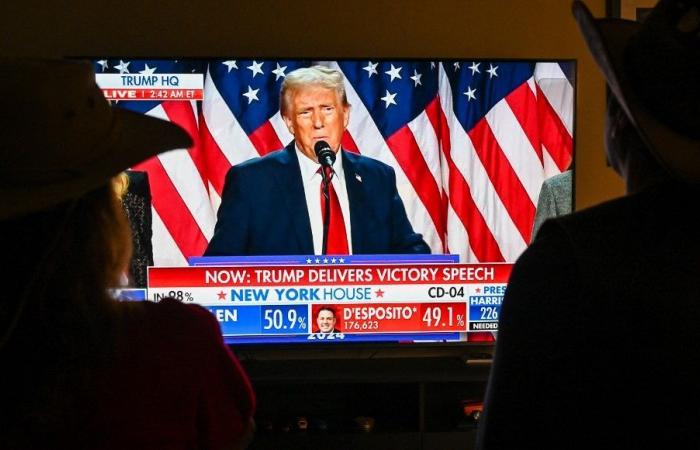
With the return of Donald Trump at the White House, elected 47th President of the United States this Wednesday, France and Europe risk experiencing new turbulence, particularly economic. The billionaire, who repeatedly repeats his slogan “America first”, defends protectionist measures, particularly in the area of trade. During the election campaign, he promised additional taxes on imported goods made abroad. “European trade policy could be the first casualty of the election of the new American president”, was also alarmed by Sylvie Matelly, director of the Jacques Delors Institute. Wines, spirits, luxury industry: what could these economic measures change for Europe and for France? France Bleu takes stock.
Customs duties to protect “Made in America” products
The American billionaire's first term between 2017 and 2021 had already been marked by the increase in customs duties. This time, the Republican wants to increase them by 10 to 20% for all products entering the United States. The increase is also likely to reach up to 60% for products coming from China, a country in Trump's crosshairs. On imported cars, he promises to increase taxes by three to protect American companies like Jeep or General Motors. These taxes would increase the prices of these imported products, thus reducing their competitiveness in the American market. Products “made in America”, less expensive, and jobs in the United States would be favored. However, economists have warned that these measures could impact supply chains around the world with increasing costs.
If Beijing and the European Union decide to sanction the protectionist measures of the United States with retaliatory measures, it would cost the EU economy $533 billion by 2029, $749 billion for the United States. United and 827 billion dollars for China, assessed the international consulting firm Roland Berger in a study.
In France, the cognac sector is worried, the luxury world is on guard
France could be hit hard by the increase in customs duties on products exported to the United States. The country is France's 4th largest customer, the first outside Europe, with 45 billion euros of products sold across the Atlantic last year. In value terms, France exports aeronautics, pharmaceutical products and beverages: wine and spirits.
The United States is one of the leading export markets for Bordeaux wines. Americans are also particularly fond of cognac. But the sector is worried about the arrival of Donald Trump in power and fears a drop in exports. Because this alcohol is already subject to tax increases from Chinawhich alone represents 25% of global cognac exports. Indeed, the Chinese authorities have decided to sanction France for having supported the implementation of European customs duties on electric cars imported from China.
The French luxury sector is also wary, with Kering (Yves Saint-Laurent, Gucci, Balenciaga) and LVMH (Louis Vuitton, Dior, Givenchy) in the lead. These French groups are already experiencing a drop in Chinese consumption.
The European Union united against Donald Trump?
Could these protectionist economic measures push Europe to mobilize to defend itself? French President Emmanuel Macron announced that he had “exchange” with German Chancellor Olaf Scholz after the election of Donald Trump. “We will work for a more united, stronger, more sovereign Europe in this new context”he said on the social network He calls on Donald Trump to work on good terms with Germany. “Germany and the United States have long successfully worked together to promote prosperity and freedom on both sides of the Atlantic. We will continue to do so for the well-being of our citizens.”declared Olaf Scholz. “Together we can do much more than against each other”he added.
The President of the European Commission Ursula von der Leyen placed herself on the same line. “Let us work towards a transatlantic partnership that continues to deliver results for our citizens. Millions of jobs and billions in trade and investment on each side of the Atlantic depend on the dynamism and stability of our relationship”she said. Traditionally, Europe defends free trade and refuses to resort to protective measures for its industry, even when it suffers unfair treatment.
France, for its part, pleads for a Europe less “naïve” also supported by former Italian Prime Minister Mario Draghi who even sees it as a necessity to avoid a downgrading of the European economy in the face of the United States and China. Furthermore, the proposal for a more pragmatic trade policy figures prominently in the report published in September by the former president of the European Central Bank. This report will be discussed by EU heads of state and government, meeting at a summit on Thursday and Friday in Budapest. “Will Europeans remain united in the face of Trump and able to identify a common European interest? It will be complicated, However, worries Sylvie Matelly of the Jacques Delors Institute. Germany sells huge numbers of cars to the United States and should curb a European response to Trump's tariffs.she judges.





